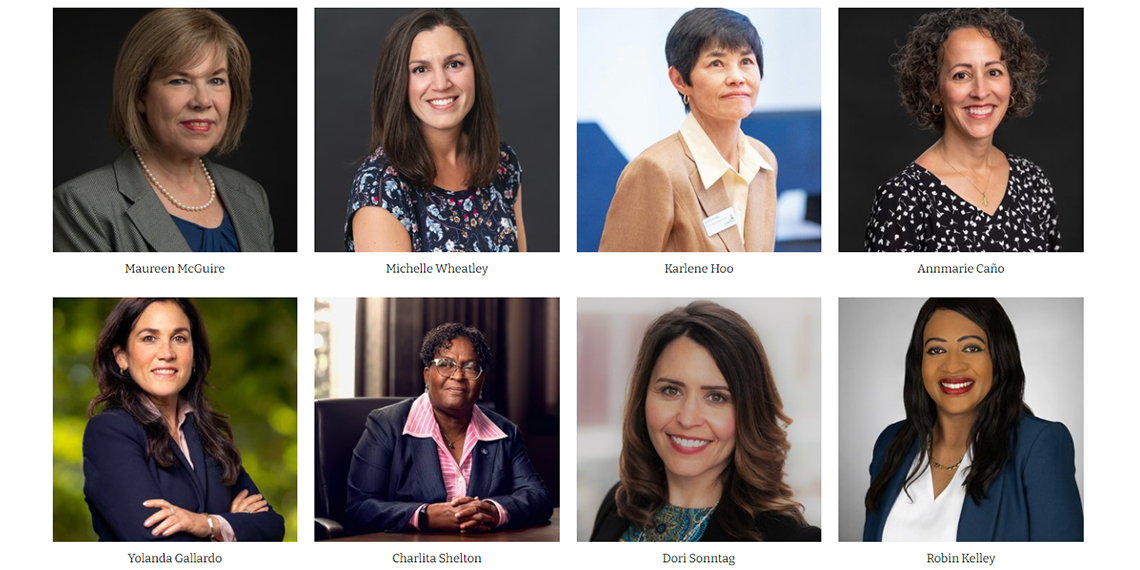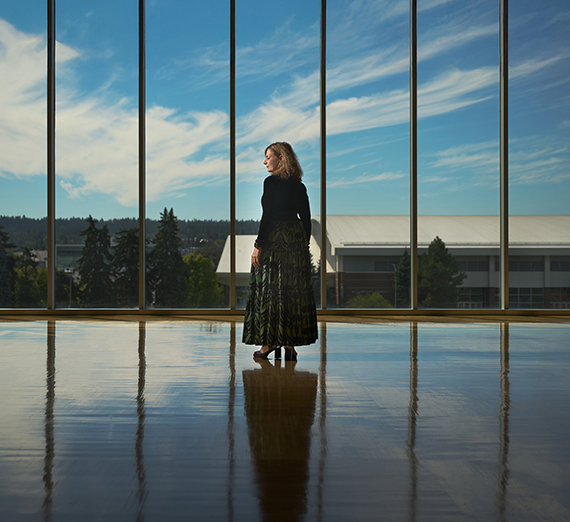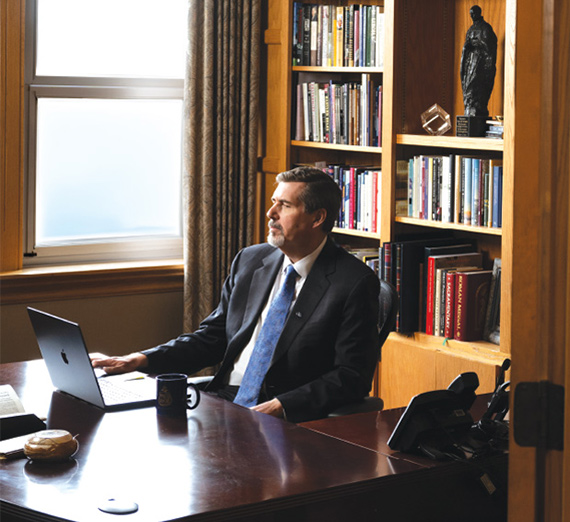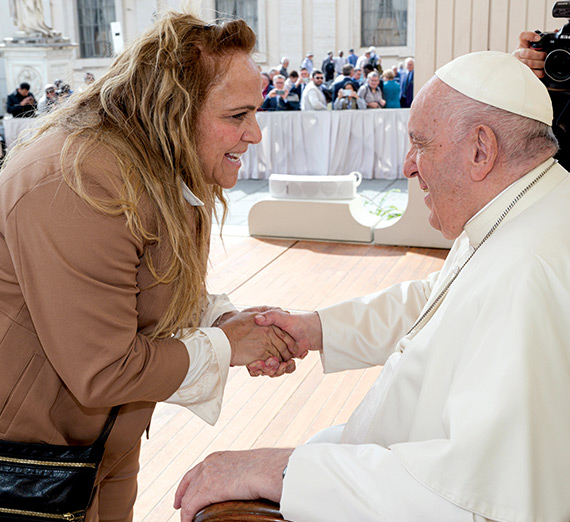Women Leaders at Gonzaga Share in Jesuit "Connections"

[Originally published in "Connections," an online newsletter published by the Association of Jesuit Colleges and Universities, March 2022]
Michelle Wheatley stepped into uncharted territory when, with a doctorate in ministry from San Francisco Theological Seminary in hand, she was named vice president for mission integration at Gonzaga University in 2019.
A graduate of both Jesuit High School in Portland, Oregon, and Gonzaga, Wheatley brought plenty of exposure to the Society of Jesus’ educational tradition and had worked in University Ministry at GU since 2007, but still ...
"I hope my work and presence invites colleagues and students to imagine being mission leaders, even if they are not Jesuits,” Wheatley says. “I hope my experiences of both blessing and brokenness, as the first woman in this role, help us as a community to discover more about who we are and who we hope to be.”Importantly for Wheatley, she finds plenty of company at meetings.
“There are a number of women colleagues at Gonzaga who inspire me every day with how they show up as leaders,” she says. “Sometimes it’s through prophetic truth-telling, unpacking complex situations, balancing relationships and tasks, or thinking strategically and holistically.”
Several of those colleagues agreed to talk about their experiences in leadership at Gonzaga. Here’s a roundtable, of sorts, that presents their reflections.
• Charlita Shelton, Chief of Staff to the President
• Karlene Hoo, Dean, School of Engineering and Applied Science
• Annmarie Caño, Dean, College of Arts and Sciences
• Dori Sonntag, Associate Vice President, University Advancement
• Maureen McGuire, General Counsel
• Yolanda Gallardo, Dean, School of Education
• Robin Kelley, Chief Diversity Officer, Office of Diversity, Equity and Inclusion
You often are at meetings that include each other. With that in mind, how do you think women are contributing at Gonzaga in a distinctive way?
SHELTON: What is exciting is that we have both diversity from a race, ethnicity and gender perspective, and incredible diversity of thought. This contributes greatly to key decisions that have been made by our women leaders here.
HOO: In how we frame our responses and in how we interpret responses and questions. We are not necessarily invested in being “right,” having “clever” responses, or providing “the” solution. We emphasize inclusivity and team-building. We practice active listening.
CAÑO: One of the things I love about the Jesuits is that they’ve recognized women’s dignity, talents and gifts from the beginning, starting with St. Ignatius of Loyola. For that reason, I find that women are seen as true partners in the work here.
SONNTAG: Many women leaders at GU are relationship-centered and bring intentionality to their work. I observe my fellow female colleagues consistently putting students first, modeling strong critical thinking skills in their decision-making and expressing gratitude. They are some of the most collaborative colleagues I have worked with in my tenure here. I observe how they seek to understand the needs of all stakeholders as they make decisions and recommendations. They regularly engage in meaningful conversations about the greater good of the University and our students – focused on “we” over “me.”
McGUIRE: It’s so important for women to be represented at the table and since coming to Gonzaga in 2013 I’ve been impressed with the number of women in leadership, and the very significant role they play in every aspect of the University. In a higher education environment, it’s important that our students see themselves reflected in leadership and know they are well- represented and heard. It means something to be able to see and know that their education can culminate in leadership opportunities, because they are witnessing that.
GALLARDO: We support one another in so many ways, even gathering every once in a while to discuss our lives. If someone needs anything, there is never a hesitation to step up and offer support.
What are the essential elements for a nurturing environment to encourage women’s leadership on our campus?
SHELTON: Supportive work environment, mentorship opportunities, leadership development, patience, being a good listener.
HOO: Non-bossy, non-bullying behavior especially among senior faculty and staff leadership.
CAÑO: It’s essential to recognize and celebrate women’s contributions if we want to signal that women belong here, including in leadership. This is especially true for women of color and women from marginalized communities like the LGBTQ+ community.
SONNTAG: I believe we must have an environment that understands the needs of women in the workforce and the barriers that may still exist in career advancement. Women are often the caregivers of their families, which means family time often blends into work time and vice versa. This requires flexible working arrangements, realistic workloads, and a “long-game” approach for growing and retaining female employees.
McGUIRE: Whether we are talking about women or other underrepresented groups, it’s important that leadership demonstrates support of all by including, valuing and respecting the contributions of all groups. I am blessed to be able to witness this every day at Gonzaga. Diversity in gender, race, religion, sexual orientation and other factors brings varying perspectives and promotes more innovation and creativity. Through diversity and inclusion we create a more fulfilled and successful educational and workplace environment for our students and employees.
GALLARDO: I don’t know that we need a nurturing environment. I think that the word “nurturing” in and of itself is always attached to women. The essential elements that make for a supportive environment for women administrators has more to do with clear expectations and respect for our work.
KELLEY: A nurturing environment will include seeing, hearing and caring about women leaders. It is an environment free from assumptions about what tasks, responsibilities and workload they can handle. It is an environment that values them as contributing leadership members and respects their expertise.
What are the top challenges facing women leaders today?
SHELTON: Being heard and taken seriously, promotability, sexual harassment, misclassifications of our emotions.
HOO: Advocating on their own behalf; systemic institutional bias against female leadership in top and key roles; trusting their own voice and ideas in situational crisis.
CAÑO: In higher education, there is still pushback for women leaders, especially if they do not “act like a man.” I am only the second woman dean of the College after a long line of Jesuits followed by a handful of laymen, and I think my leadership style is confusing to some. For instance, I received feedback from one person that they were ready for me to stop being compassionate and start holding people accountable. And I wondered, why can’t I do both?
SONNTAG: Work-life balance, impostor syndrome, pay gap
McGUIRE: For women, who are often the primary child care provider and manager of the household, it is often difficult to achieve work/life balance and have the same career opportunities as male counterparts. They often find themselves working harder to prove themselves and balance their responsibilities. It continues to be a challenge for women to balance the many hats they wear and have the same promotional opportunities as their male counterparts.
GALLARDO: Being perceived as angry instead of appropriately assertive; not taken as seriously; being labeled as a “cheerleader” (not in a positive way) when demonstrating enthusiasm or passion in the work; always having to go above and beyond to demonstrate competence.
KELLEY: Top challenges include being treated equally and equitably. Women leaders are not compensated the same as men. Male leaders are often provided more resources and opportunities. Women leaders must navigate spaces differently; when one makes a direct comment or a firm decision, she is not perceived the same as a male engaging in the same actions. Women must walk a fine line of being assertive while not being perceived as aggressive or unlikable. Internally, women tend to suffer from impostor syndrome, which is to question whether they deserve a leadership role: "Should I be here? Am I enough? Am I qualified?”
What are the distinctive ways you believe you are contributing at Gonzaga?
SHELTON: Being able to provide an outsider-now-insider point of view to a university that has many, many years of institutional memory. It is the notion of “thinking outside the box” as opposed to hearing responses like “We have always done it that way” or “That’s not the way Gonzaga does certain things.” Providing input that is more progressive in thought, challenging and sometimes uncomfortable to hear.
HOO: Promoting access for diverse student entry into the School of Engineering and Applied Science (SEAS) by growing focused outreach strategies such as the SEAS summer immersion program for high school women, and the pre-engineering entry path for students who need to demonstrate basic math and science proclivities in their first semester in SEAS. I
intentionally participate in state and national networking events to encourage partnerships and collaborations to elevate the impact of GU’s mission and faculty research. The other obvious distinction is being a woman (and non-Caucasian) leader in male-dominated professions (engineering and computer science). I see my decanal appointment as providing a visible role model to the female and underrepresented students, faculty and staff. I also bring unique leadership experiences from my previous academic administrative roles at two large public universities.
CAÑO: In some ways, what I see as distinctive about my leadership is really core to leadership at a Jesuit institution. Cura personalis and Ignatian discernment principles guide so much of how I approach my decision-making, including empowering others to make decisions for the greater good. Because I am a woman, some think this approach is feminine. But for those who see this approach as an embodiment of Ignatian spirituality, I think it’s a refreshing change.
McGUIRE: As an older woman (I am in that group over 40 years old who are protected from age discrimination) I bring a depth of experience that I find beneficial in analyzing and advising in my day-to-day work. Many of the issues and challenges I face have been previously encountered in one way or another, and I’ve seen what works and doesn’t and how best to approach a problem. I can call on that background to guide me in my current work. I’ve also been fortunate to have had excellent mentors and supervisors over the years whose leadership skills I was able to observe and learn from.
GALLARDO: I am a Latina from the Southwest who has spent her career thinking about ways we can all wake up to how we engage with and are complicit in systems of oppression. I enjoy digging into difficult concepts and moving through the tough conversations so we can all be genuine with one another, in our work and our relationships. I believe this should be woven into our curriculum, our policies and our practice. I try to contribute in this way, every day.
KELLEY: I have over 23 years of experience in my discipline. As a Black/African American woman and leader, I am a role model for people who look like me and have a shared culture. I'm aware that I embody the intersectional identities of many of the people I work with to support and create a safe, welcoming, inclusive campus environment. I earned my doctorate in 2017. Of all doctoral recipients, Black women represent 3.1%. I am bringing the strategy, focus and tactics for sustainable and transformational change. I’m showing students, faculty, staff and alumni of color or who identify as female that they are leaders and can persevere while working for the common good. I am working to create organizational and social change that is not necessarily flashy or attention-getting, but structural changes that will transform GU in a lasting way.
Echoing the thoughts of her colleagues, Wheatley thinks Gonzaga is at its best “when we create spaces in which our women leaders can:
• be authentically themselves and share freely of their gifts and expertise
• speak openly and courageously about the realities of our work
• imagine and innovate
• collaborate
• care for each other and acknowledge the strains of doing this work.”
- Academics
- Alumni
- Faith & Mission
- Diversity & Inclusion
- Division of Mission Integration
- Alumni
- News Center




